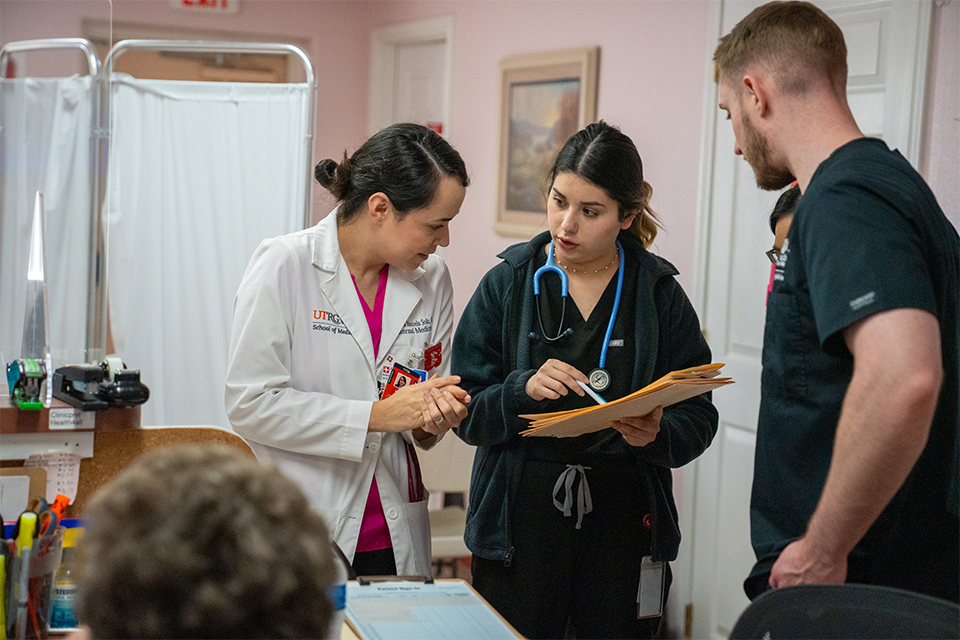- December 9, 2024
Serving Our Own

UTRGV School of Medicine’s Student-Run Clinic providing free healthcare services to underserved communities
By Heriberto Perez–Zuñiga
Across the open fields of Peñitas, Texas, where the rhythm of life is set by the hum of the wind and the occasional gallop of a horse, residents line up early each month outside the Proyecto Desarollo Humano building to receive free health exams and resources provided by the UTRGV School of Medicine’s Student-Run Clinic.
In partnership with Clínica María Luisa, the Student-Run Clinic provides Peñitas residents with health care resources they might not otherwise have access to.
Under the guidance of volunteer physicians from the UTRGV School of Medicine, medical students gain hands-on experience while offering much-needed care to the community. For many low-income residents, the clinic is the only opportunity they get to visit a healthcare provider.
“Even though it takes a little longer than a regular clinic visit, patients are getting a full exam,” said Shirley Arnolde, Clínica María Luisa clinic administrator. “Students are learning, and the patients are benefiting. It’s a win-win.”
ADDRESSING HEALTHCARE GAPS
The Student-Run Clinic addresses critical healthcare gaps in a region where chronic conditions like diabetes and hypertension run rampant.
Many patients arrive with complications that could have been avoided with earlier access to care. For some, these visits have meant avoiding catastrophic health outcomes, like amputations due to unmanaged diabetes.
Each month, a dedicated team of approximately 40 volunteers, including medical students, physicians, nurses, and dieticians, come together to make the clinic possible.
The clinic holds a special significance for second-year UTRGV School of Medicine student Yolanda Gutierrez, who grew up in Pharr, Texas, and witnessed family members struggle to access healthcare due to a lack of insurance. It wasn’t until she attended college that she gained access to regular medical care herself.
“Our patients often have to choose between paying for medication or putting food on the table,” Gutierrez said. “We’re doing what we can to fill that gap, even if it’s just scratching the surface.”
Gutierrez finds that volunteering at the clinic is a meaningful experience.
“Being able to volunteer here feels full circle,” she said. “I’ve been in the shoes of many of our patients. Now, I get to help them take control of their health.”
In addition to medical care, the clinic helps patients find ways to afford their prescriptions by connecting them with resources available locally or providing medication samples.
Arnolde noted these efforts leave a lasting impression on the community.
“Even though I don’t speak Spanish, there’s a common language here,” Arnolde said. “They know we’re here to help, and that fills my heart.”
HANDS-ON TRAINING
Alyssa Sepulveda, a second-year UTRGV School of Medicine student and McAllen, Texas native, said the clinic offers students hands-on training and the opportunity for real-world interactions with patients.
“Volunteering allows me to take the things that I’ve learned in the classroom and put them into practice,” she said. “I’m learning how to conduct clinical exams, communicate with patients, present to physicians and gain experience working in a collaborative environment.”
Beyond the clinical experience, the program provides a deeper understanding of healthcare disparities.
Dr. Michael Hocker, dean of the UTRGV School of Medicine and senior vice president of UT Health RGV, emphasized the clinic embodies the school’s mission of transforming healthcare in underserved communities while addressing the state’s physician shortage.
“The demographic challenges we face in the Rio Grande Valley mirror those across Texas,” Hocker said. “The work being done in Peñitas doesn’t just stay in the Valley. The lessons students learn are carried with them to other regions, amplifying the impact throughout the state.”
Texas currently faces a physician shortage, particularly in rural and underserved areas. Hocker noted that programs like the UTRGV School of Medicine’s Student-Run Clinic are models for how academic medicine can address this crisis while serving communities in need.
For Sepulveda and Gutierrez, their work at the clinic reminds them of why they entered medicine in the first place: to serve, heal and give back to the community that shaped them.
“It’s humbling to see the difference we’re making,” Sepulveda said. “It motivates me to keep learning and growing so I can serve them better in the future.”

